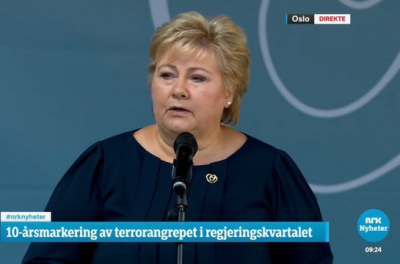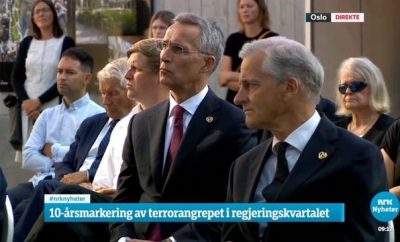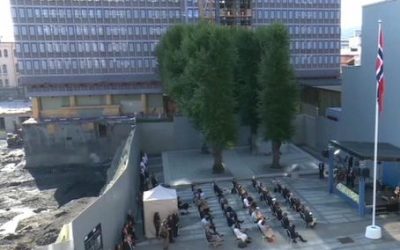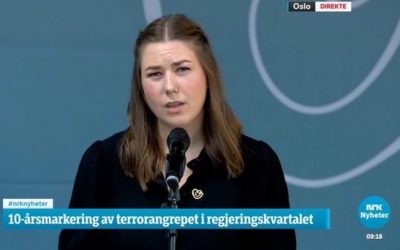After 10 years of suppressing difficult debate, Norwegian officials are finally acknowledging the political aspects of a home-grown white supremacist’s terrorist attacks on July 22, 2011. Both the current and former prime ministers along with several others, including Crown Prince Haakon and the bishop of Oslo, made it clear at memorial ceremonies on Thursday that the attacks were not only an assault on Norway’s democracy, but also “a politically motivated act of terror directed at the Labour Party, (its youth organization) AUF, and their ideas.”

Those were welcome if overdue words uttered by the Conservatives’ Prime Minister Erna Solberg when she spoke at the first major event of a long day. It marked the 10th anniversary of the twin attacks that killed 77 Norwegians and left hundreds of others scarred for life “both in body and soul,” as Oslo Bishop Kari Veiteberg put it at another memorial ceremony shortly thereafter.
Solberg noted how the entire nation was also “knocked to the ground” by the attacks that changed Norway in some ways but also brought forth its greatest strengths. Solberg went on to express welcome official gratitude to everyone who met the challenge head on 10 years ago.
“I want to say tusen takk (a thousand thanks) to everyone who was involved in saving lives that day, both here at the government complex (which was bombed and has since been the site of annual memorials) and on and around Utøya (the island were the Labour Party’s youth organization was holding its annual summer camp),” Solberg said. After detonating his powerful homemade bomb, the terrorist managed to go ashore on Utøya, where he unleashed a massacre that killed 69 more people, two as young as 14.
“Thanks also to everyone who made heroic and critical contributions when they were needed most,” Solberg continued, “and thanks to everyone who’s recently brought us all back to the painful hours and given us honest and direct descriptions of what pain the right-wing extremist violence caused.” She was referring to months of new debate and complaints that both she and her predecessor, Labour’s former leader Jens Stoltenberg, have, over the years, emphasized the need for better preparedness at the expense of what motivated the terrorism.

Stoltenberg, now secretary general of NATO, was also attending the memorials and spoke at the next ceremony inside the Oslo Cathedral, which had served as a key gathering place during the days following the attacks 10 years ago. Stoltenberg had chosen at the time to emphasize Norway’s democracy as the main target of the terrorist, not his own party or its youth group. He admitted this week to the “difficulty” of being in a “double role” as both the party’s leader and the leader of the entire nation, as well as a reluctance to be in the role as victim. Stoltenberg opted, therefore, “to meet (the terrorist’s) hatred” with more democracy, openness and love,” but he readily acknowledged, like Solberg, that “the hate is still there.”
He also, finally, described the terrorism 10 years ago as “political … with a goal of attacking AUF and the Labour Party.” The hatred “wasn’t blind,” he noted, but specifically and literally aimed at Labour and its youth group. “The intention was to change our country through violence,” he added. “July 22nd was a right-wing extremist attack on AUF and the party.”
He later told state broadcaster NRK that “this clearly was a right-wing extremist’s attack on our social democracy, but that came in the shadow” of the (earlier) debate over (Norway’s lack of) preparedness at the time and terrorist Anders Behring Breivik’s frame of mind. Breivik’s defense attorney and two psychiatrists had initially deemed him insane, but the court’s call for other opinions resulted in an official assessment that the terrorist had carefully planned his attacks over a period of at least two years and was sane when he carried them out.

Stoltenberg stressed that the memorials on Thursday were directed “first and foremost at those who lost their lives, those who were injured, those who survived and those who lost loved ones.” He called them important, noting that he’d also experienced terror in Brussels (where he’s been living since 2014 as head of NATO), visited Christchurch, New Zealand after a mosque there had been targeted by a right-wing extremist allegedly inspired by the attacks in Norway, and has been in charge of fighting it in Afghanistan. “Terrorism comes in many forms,” he said during his address in the Oslo Cathedral.
What’s perhaps disturbed Norwegians the most is how Breivik was one of their own, the son of a Norwegian diplomat who later grew up with his mother on Oslo’s affluent west side. He nonetheless was radicalized, soon lost friends who’d become offended by his white supremacy, and ultimately became a loner who spent hours on the then-rapidly expanding Internet and at a remote farm in eastern Norway where he built his bomb and gathered his weapons. His attacks couldn’t be written off as the work of a deranged holy warrior from another culture. “The terrorist was one of us,” stressed the current leader of AUF, Astrid Hoem.

Both Solberg’s and Stoltenberg’s speeches followed the first of three also delivered on Thursday by Hoem. She’s among those angry and frustrated that AUF and survivors of the attacks 10 years ago haven’t received the help they needed, and she spoke in much stronger terms than any of the top politicians. She stressed how 77 people were “bombed, shot and killed” in attacks that were “so brutal” that it was difficult to comprehend them in the first weeks, months and even years after they occurred.
Survivors and AUF members have been experiencing something of an “awakening” during the past few years, speaking out and writing books about their ordeals. Hoem made it clear they all expect a national political effort to finally come to terms with who the terrorist targeted, why, and what motivated him. The goal is to learn how to spot radicalization early and realized that “all terror begins with hateful words.”
Stoltenberg, his successor as Labour Party leader, Jonas Gahr Støre, Hoem and Solberg herself now all seem to agree that the best way to honour the memories of those killed in 2011 and others targeted in the years since is to keep fighting the right-wing extremism and hatred that still exists in Norway and around the world. Støre stressed “the importance of the political dimension” in his remarks later in the day, at another memorial on the island of Utøya. He also thanked survivors for writing books and sharing their stories, even though they’re not pleasant to hear.
A mother and a father whose children were shot and killed on Utøya also spoke and recited poems at the memorials, with the father lamenting “too much silence” in the wake of the attacks. Crown Prince Haakon, who met and consoled distraught survivors and families amidst chaos at the local Sundvollen Hotel right after the attacks, declared that “we must dare to talk about what happened,” adding also that the terrorist “wanted to ram Labour, AUF and the government.” All agreed the hatred that motivated Breivik still exists and needs to be stopped.
“Today we mourn together and remember the 77 who never came home,” Solberg said in her own remarks earlier in the day. “They shall remind us every day about how important it is to fight for the mutual confidence, openness and diversity we have in Norway. That fight will never be over.”
newsinenglish.no/Nina Berglund

